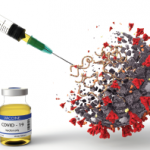Abstract 0455: Abatacept reverses subclinical arthritis in patients with high-risk to develop rheumatoid arthritis—Results from the randomized, placebo-controlled ARIAA study in RA-at risk patients6 Research by Rech J, et al.
Given the potential for antibodies against citrullinated proteins (ACPA) to herald a sooner transition to manifest RA, the opportunity to abrogate or slow that progression may invite therapeutic intervention.
Patients who were ACPA positive with MRI signs of inflammation were randomized to receive subcutaneous abatacept for six months. Arthritis developed at a higher frequency of patients receiving placebo (34.7%) compared with those receiving abatacept (8.2%, P=0.0025).
Although some may argue that ACPA positivity and MRI-observed synovitis represent the forme fruste of RA, the potential benefit of abatacept to improve subclinical arthritis supports the concept that early intervention with abatacept may prevent, or at least delay, the development of RA.
COVID-19
COVID-19 continues to capture the attention of rheumatologists and patients alike. Although rituximab has been repeatedly recognized to be associated with a suboptimal response to COVID-19 vaccination, perhaps warranting a supplemental vaccine dose, the impact of other RA therapies on COVID-19 vaccination is less clear.
Abstract L02: COVID-19 vaccine in immunosuppressed adults with autoimmune diseases7 Research by Colmegna I, et al.
Results from this prospective, open label trial at two centers in Quebec of patients with seropositive RA on stable treatment for at least three months found that on average, patients with RA did not have significant side effects or disease worsening (i.e., flare) after vaccination. As observed previously, immunogenicity, measured by anti-spike antibodies and antibodies against its receptor binding domain, was poor in rituximab-treated patients (Note: Only 17.6% of patients responded after the second dose) and was numerically lower (i.e., 88%) in JAK inhibitor-treated patients. Biologic-treated patients had a robust immunogenicity in this study, although the response to specific biologic agents was not reported.
This study adds to growing evidence that COVID-19 vaccination is safe and generally well tolerated in patients with RA or other autoimmune diseases, albeit with some small risk for adverse events or flare. It also raises some concerns that other immunomodulators, such as JAK inhibitors, may attenuate COVID-19 vaccine response.
Abstract L18: Humoral and cellular immune responses to a second dose of COVID-19 vaccine BNT162b2 in people receiving methotrexate or targeted immunosuppression: A cohort study8 Research by Mahil SK, et al.
Because immunomodulatory agents have potentially important implications on vaccine response for patients for RA or other disease indications (e.g., psoriasis, psoriatic arthritis), new data were presented on the influence of methotrexate (MTX). Patients with psoriasis (n=82) receiving MTX (n=14) or TNF inhibitors (n=19) all were shown to have seroconverted after the second vaccine dose. However, detectable T cell responses were lower in MTX-treated patients (62%, 95%CI 32–86) or targeted biologic users (74%, 95% CI 60–85%) compared with healthy controls (100%, P=0.022).



